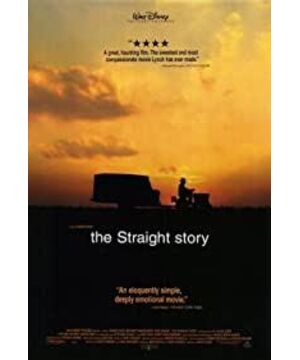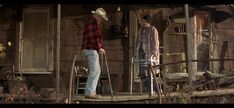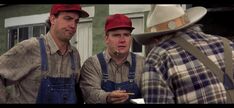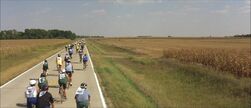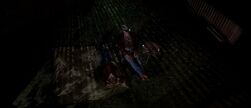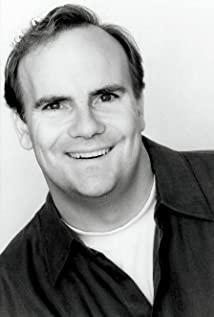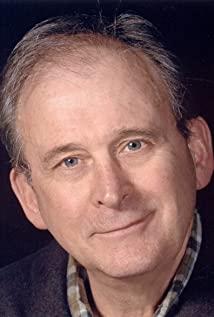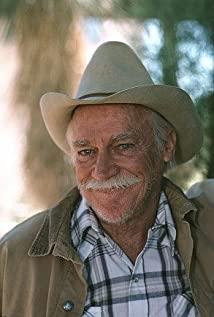It is the time of year when the wheat is ripe. The wind blew, golden wheat waves surging in layers on the horizon. An old man with white eyebrows, driving a small harvester locomotive, slowly drove on the edge of the waves. The speed of the front of the car is very slow, so slow that it is only slightly faster than walking; the tune of the film is so light and light that it is only softer than the wind. The old man was holding a cigar, waving to the mother and son drying clothes by the roadside, saying goodbye to the sunshine crawling across his face. The old man's name was Street, and he was over seventy years old and insisted on visiting his brother who had a stroke by himself. For a journey of more than 500 kilometers, there was only a wooden cart that was towed behind the front of the car. The wooden cart was surrounded by plastic sheeting and contained a blanket, a gripper, two crutches, two stools, and a pile of sausages. This is a means of transportation, a house, and a travel companion. When you get in the car, you get off, and when you start, it ends. This is the law, but if it is only like this, life and journeys are too boring - just like a coffee bean, swallowed whole, it is no different from taking a meal and a pill , but if it is ground and boiled, it must be full of fragrance. Was it the same for Street's journey? It doesn't seem so. The plot of the movie is very ordinary, like chatting under the sun on a winter afternoon. There is no chat, and when you get tired of chatting, you will lean on the chair and stare at the big tree in the sky in a daze. Our male protagonist eats when he is hungry, sleeps when he is sleepy, tightens his hat when it is windy, and finds a place to hide when it is raining - it is no different from the old lady on the street who pulls home, trivial and tasteless. The pace of the film is very slow, basically with the front of the car, unfolding the plot layer by layer, like a walk. Yes, it is a walk, walking through villages and wheat fields during the day, and perching in the stars and bonfires at night, calmly like a river running through the plains, without ups and downs, and without rushing. The actors are ordinary, ordinary to the point of randomness, like a passer-by in every movie you've ever seen. The girls, shop assistants, bartenders, veterans, repairmen, etc. that I meet by chance are all like this. Personality language and clothing styles are also common in life, nothing special. The framing of the movie is also very common, nothing more than highways, wheat fields, houses, bridges, mountains and forests, as long as people who have traveled and traveled have seen it, there is neither beautification nor ugliness, and there is no application of light and shadow, special effects and other technologies. Ordinary like a random photo. All of this is as simple and casual as a road that has not been deliberately built. It will pass through beautiful mountain and flower valleys, and it will also pass through poor, barren and barren; it is neither smooth nor bumpy. Just a peaceful and real walk, occasionally a touch of joy or sadness. If that's the case, then it's not a movie worth writing, just like Fang Ning A quiet pond, without wrinkles or waves, is always boring, but suddenly a fish wagging its head and tail, passing through the lotus, then the whole pond comes to life, which is very interesting. The fish in this movie is the encounter of Streeter interspersed on the road, and the life of Streeter shown in the encounter. Street's first encounter was with a girl who ran away from home. The girl became pregnant out of wedlock and ran away from home for more than five months. The girl said that her family didn't love her and didn't care about her. Street sat by the campfire, holding a branch and said softly, everyone is a branch, it can be easily broken, and a bundle of branches will be much stronger, this bundle of branches is family. Then he told the girl that he had five children, one of whom had died, and that he now lives with his daughter, who has mental problems and has been deprived of custody of her children... In fact, we can imagine that five children, one died, one went crazy, and the other three? Why not live with them? Did you want to or did those kids abandon Street? Under the stars, Street said he liked the stars; in the storm, Street said he liked lightning and storms; in the face of such a broken family, Street said he loved his family and his daughter - he said she Just a little stuttering, but always keep the house in order. In fact, when I knew my father was going to travel far, I only knew how to buy him a bunch of sausages. The girl who finally ran away from home left without saying goodbye, leaving behind a bundle of twigs. The second encounter was a middle-aged lady. The lady hit and killed a deer on the road, then collapsed, yelling and shedding tears in front of the stranger, Street, complaining about the misfortunes of life and cursing God's injustice. Her misfortune is that she drives a 40-kilometer car to and from get off work every day. Recently, she always hits a deer. After she vents, she runs away. During the whole process, Street did not say a word, but at the end he cut some venison and took the antlers. I think, if the lady knew that although Streeter was ill (heart, respiratory system, digestive system, etc., and could not even walk normally), but she was poor and could not get further examinations, the so-called treatment would be to add With a cane, I don't know what to think. The third encounter was a group of young people riding a bike. Camping together at night, a young man who was having a lot of fun said to the quiet Street beside him, "Sir, what is the most regrettable thing in your life?" Street replied earnestly that at my age, I always think of the years of my prime—much like a weed on the side of the road, when it is about to decay, I finally miss the spring, so I love it and cherish it very much. The third encounter was with an old veteran. The two were about the same age, drinking and chatting. The veteran veteran said he fought alongside his comrades during World War II and was the only one who survived. Street said he was a sniper who accidentally killed his own scout who had saved everyone countless times. Two gray-haired old men, weeping bitterly, the veterans had nightmares for decades, and Street guarded the guilt for decades. The veteran has been drinking, and Street has been drinking milk, one drunk and one sober. The fourth encounter was with a priest. That night Street was camping in a cemetery, and the priest brought dinner. Street talked about the story of him and his younger brother, who had been inseparable since childhood, but quarreled constantly when they grew up, and finally parted ways and did not see each other for ten years. Hearing that his brother had suffered a stroke, the brotherhood in his blood boiled, and he had to visit his brother regardless of his old age and frailty (sickness and blurred vision). At the end of the film, Street meets his younger brother. stand Outside the house, Street anxiously called out his brother's name, but his brother finally agreed and staggered out. Street laughed. The younger brother looked at the front of Street's harvester and the wooden cart, and said, you are driving this thing to see me? Street said yes, and then there was a wordless silence. The golden setting sun not far away, through the branches and yellow leaves of the woods, quietly shone on the house and on the old faces of the two old men. At this point, the movie ended peacefully, but my heart was not at peace. Because what I see is not only an old man who has experienced vicissitudes, but also a full life with sorrow, pain, guilt, regret, joy and expectation. Full of kindness towards the world, nostalgia for life, no self-abandonment, no resentment, and calmly accept the starry sky, wheat fields or rough winds and rains in life. So I am moved. Asking someone to drive or take a bus can get you there quickly, and you can forget your guilt when you're drunk, but Street doesn't. He regards pain and joy as the same, uses continuous sobriety of physical and mental pain to redeem the guilt of the soul, and spends helpless time with temporary joy or kindness. So I admire it. When our memory wakes up, life quietly leaves, wandering in the wind, rain, frost and snow of these years, until we are old, and finally return to our hearts. Only then did it realize that joy is only a gap in sorrow, and we have to walk slowly for this gap. What is the essence of life? I closed my eyes and thought for a long time: Or maybe Mr. Street's emotional, searching eyes. Kai, wandering in the wind, rain, frost and snow of these years, until I am old, I finally return to my heart. Only then did it realize that joy is only a gap in sorrow, and we have to walk slowly for this gap. What is the essence of life? I closed my eyes and thought for a long time: Or maybe Mr. Street's emotional, searching eyes. Kai, wandering in the wind, rain, frost and snow of these years, until I am old, I finally return to my heart. Only then did it realize that joy is only a gap in sorrow, and we have to walk slowly for this gap. What is the essence of life? I closed my eyes and thought for a long time: Or maybe Mr. Street's emotional, searching eyes.
View more about The Straight Story reviews


